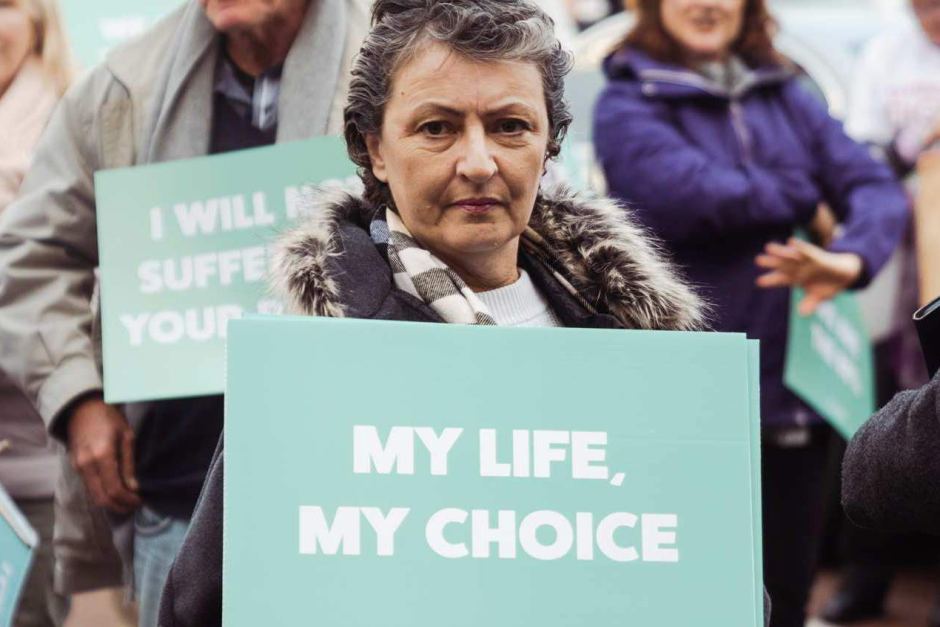My Death, My Decision has called on the British Medical Association (BMA) members to consider compassion and empathy by voting in favour of assisting dying in the association’s consultation which closes on 27 February.
Last year, the BMA announced it would survey its members after a motion was passed at its annual policymaking meeting to hold a consultation and ‘support patient autonomy’.
The BMA had previously adopted a neutral stance on assisted dying in 2005 but then changed and became opposed in 2006. This is the first time all 160,000 members of the BMA will be polled on the issue.
Later this month, the results of a similar consultation by the Royal College of General Practitioners will be announced.
Doctors will be asked whether the BMA should actively support, oppose, or neither actively support nor oppose (take a neutral stance) on a change in the law to permit doctors to prescribe drugs for adults of sound mind, who are either incurably suffering or terminally ill, to end their life. The survey will similarly ask what position members think the organisation should take in regard to doctors administering lethal substances (often known as euthanasia).
Dr John Chisholm, BMA Medical Ethics Committee chair, said:
‘Doctors and medical students have a particular interest in discussions around legislation because any change in the law would impact on them not just personally but professionally. Therefore, this poll will allow us to gather information about the breadth of views held by our membership, which will then inform any future policy decisions and how we respond to any proposals for a change in the law.’
MDMD urges BMA members to vote in favour of assisted dying reform, and for others to encourage their doctors to support a change in the law.
Trevor Moore chair of the campaign group My Death, My Decision said:
‘We strongly welcome the British Medical Association’s decision to give their members a say on this issue.
The right to choose how, where, and when we die is a fundamental human right, and it is unacceptable that the law forces those facing unbearable pain or terminal illness to suffer in ways that often cannot be palliated. More than one person a week now travels from the UK to end their life in Switzerland – this is double what the number was five years ago.
There is a better way forward. New evidence from countries, including Canada, demonstrates that a balance between respecting autonomy and robust safeguards can be achieved. We urge all doctors who believe in reason, compassion, and empathy to support a change in the law.’
NOTES
For further comment or information or requests for interviews, please contact My Death, My Decision Campaigns and Communications Manager Keiron McCabe at keiron.mccabe@mydeath-mydecision.org.uk or phone 020 7324 3001.
More about the BMA’s consultation
The BMA is a trade union representing and negotiating on behalf of 160,000 doctors in the UK. In 2019, at the BMA’s main policymaking meeting members voted for a motion to poll members on whether the association should adopt a neutral position on assisted dying.
The BMA’s consultation will run from 06 February until 27 February and is being organised by the independent organisation Kantar.
Members will be asked whether they believe the BMA should actively support, actively oppose, or neither actively support nor actively oppose (take a neutral stance on) a change in the law to permit doctors to prescribe drugs for eligible patients to self-administer to end their own life. They will also be asked whether the BMA should actively support, actively oppose, or neither actively support nor actively oppose (take a neutral stance on) a change in the law to permit doctors to administer drugs with the intention of ending an eligible patient’s life.
Results from the survey will be published ahead of the ARM, which takes place in Edinburgh from 21 to 25 June.
2019 Motion
That this meeting notes the recent decision by the Royal College of Physicians to adopt a neutral position on assisted dying after surveying the views of its members, and:
i) supports patient autonomy and good quality end of life care for all patients;
ii) recognises that not all patient suffering can be alleviated;
iii) calls on the BMA to carry out a poll of its members to ascertain their views on whether the BMA should adopt a neutral position with respect to a change in the law on assisted dying.
The law on assisted dying in the UK
Under section 2(1) and 2(2A) of the 1961 Suicide Act, it is unlawful in England and Wales to encourage or assist someone to end their life. Anyone found guilty of an act ‘capable of encouraging or assisting the suicide or attempted suicide of another’ can face up to 14 years’ imprisonment.
Recent updates
Assisted dying is now permitted for terminally ill and incurably suffering people in Canada, Belgium, Italy, Luxembourg, and the Netherlands. It is also permitted specifically for terminally ill people in Colombia, ten US jurisdictions, and the Australian states of Western Australia Victoria.
In January 2019, MPs debated in a Westminster Hall debate proposals for an independent call for evidence into assisted dying. MPs from all major political parties called for the Secretary of State for Justice, Robert Buckland QC MP, to initiate a formal call for evidence on the impact of the UK’s existing law.
Last year two members of My Death, My Decision living different conditions that mean they are facing incurable suffering separately applied for permission to judicially review the law on assisted dying in England and Wales. Paul Lamb, who is paralysed from the neck down, was refused permission from the High Court in December 2019; Phil Newby, who suffers from motor neurone disease, was denied permission from the Court of Appeal in January.
About My Death, My Decision
My Death, My Decision is a grassroots not-for-profit organisation that campaigns for a compassionate and balanced approach to assisted dying in the UK. As a growing movement we are at the forefront of social change: nearly 90% of the public now favours a change in the law to allow adults of sound mind, who are either terminally ill or facing incurable suffering, the option of a peaceful, painless, and dignified death.
Unlike some right-to-die organisations, My Death, My Decision does not believe that assisted dying should be restricted to only those who are terminally ill with a prognosis of six or fewer months left to live. Just as compassion for others motivates people to support assisted dying for those who are terminally ill, we believe it should also underscore support for those facing incurable suffering, as were the late Tony Nicklinson and Debbie Purdy, and now Paul Lamb and Phil Newby.
Read more about how nearly 90% of the public support an inclusive change in the law.
Read more about research which found that more than one British citizen a week now ends their life in Switzerland.
Read more about My Death, My Decision’s campaign for an inclusive change in the law:
http://www.mydeath-mydecision.org.uk/
 Germany’s constitutional court has ruled that a law forbidding professional assistance to die is unconstitutional, in a move that is being seen as a major victory for assisted dying campaigners.
Germany’s constitutional court has ruled that a law forbidding professional assistance to die is unconstitutional, in a move that is being seen as a major victory for assisted dying campaigners.





 The Royal College of General Practitioners has maintained its 14-year opposition to assisted dying, despite a majority of GPs voting to support a change in the law or adopt a neutral stance.
The Royal College of General Practitioners has maintained its 14-year opposition to assisted dying, despite a majority of GPs voting to support a change in the law or adopt a neutral stance.





Recent Comments